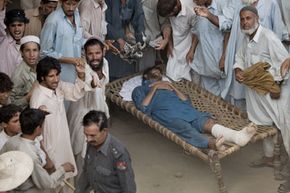Causes and Triggers of Riots
Riots differ from lawful protests or demonstrations because of the violence that ensues. They also differ from these events in that they're more chaotic and disorganized. While you may receive an invite to a protest or spend hours planning an effective assembly, riots are more akin to massive mind melds between individuals.
The people who participate in a riot may have never met one another before, but they're likely all linked by an underlying social problem or complaint. Poverty and race form the bedrock of many riots. People who lack economic opportunity often participate in a riot because they have nothing to lose by doing so, whereas middle- and upper-class people tend to stay away from these violent events that could sully their livelihood. Race becomes an issue when a particular ethnicity feels that they're always singled out for punishment or when a different ethnicity encroaches on their perceived turf. With both social issues, the affected people likely feel that they're not getting a fair shake from the government.
Advertisement
People can feel that way and not act on it, though. When you ride public transportation, the other people on your bus or your train may be angry at the government, their employer or just anyone who is different from them. But they don't turn the bus into a danger zone, and many protests and demonstrations gather like-minded individuals eager for change without incident. What provokes aggrieved people to turn violent? While riots may be due to underlying social issues, there is usually a specific trigger that converts rage into action.
Past triggers have included assassinations (riots raged for days after Martin Luther King Jr. was shot) and unpopular jury verdicts (the 1992 riots in Los Angeles started after a jury acquitted police officers caught on tape beating Rodney King). Triggers tend to be acts of authority deemed outrageously unfair or acts in which it seems that authority has failed, such as a rigged election, a corrupt jury or a labor boss ignoring federal safety standards. Even a rumor of such a thing can spur people to act. Sporting events tend to cause riots after both good and bad outcomes for one's particular team, but by and large, riots are fueled by a sense of injustice.
When that trigger occurs, that's when the mind-reading begins. People must recognize the trigger as an event that will galvanize others, and they must also know where to meet their fellow citizens and when to begin rioting. We'll examine this mass telepathy on the next page.
